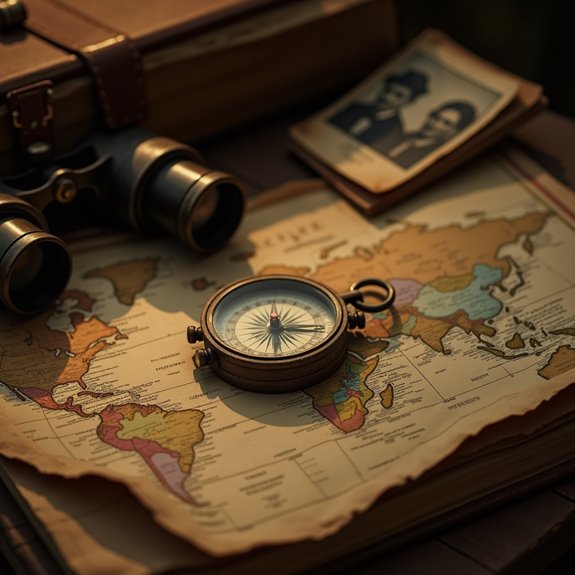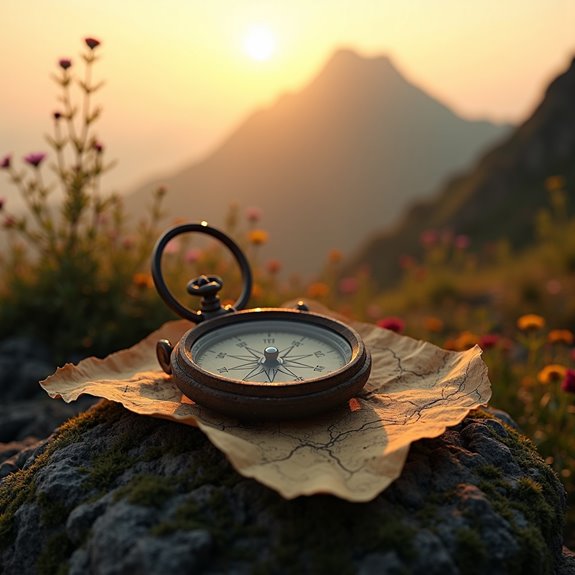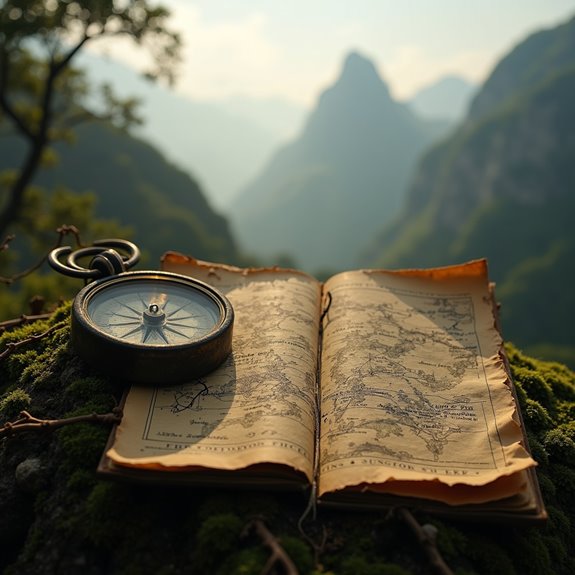Forgotten Explorers Who Changed History
Forgotten explorers like Richard Francis Burton and Alfred Russel Wallace greatly influenced history, yet their contributions often fade into the background behind more celebrated figures. Their adventures into the unknown opened up new cultures and ecosystems, challenging existing narratives and inspiring future generations. As their stories unfold, the complexities of their journeys reveal how much they shaped our understanding of the world today. What other tales might emerge from the shadows of history?
Introduction

Explorers have long captured the imagination of many, yet countless figures fade into obscurity over time. While names like Columbus and Magellan echo through history, numerous lesser-known explorers also shaped the world. These individuals ventured into the unknown, driven by curiosity and a desire for discovery. Often, their contributions remain unrecognized, overshadowed by more famous counterparts. They mapped uncharted lands, navigated treacherous seas, and bridged cultures, yet their tales are seldom told. As we investigate the stories of these forgotten explorers, it becomes clear that their journeys are just as essential to our understanding of history. By bringing their accomplishments to light, we celebrate the spirit of exploration that continues to inspire generations.
Explorers of Uncharted Territories

How did some adventurers find their way through lands that had never been seen by Europeans? With courage and cunning, these explorers set off on treacherous journeys, driven by a thirst for discovery. They navigated vast, uncharted territories utilizing rudimentary maps, celestial navigation, and their keen instincts. Many forged alliances with local tribes, learning their languages and customs, which proved essential for survival in unfamiliar landscapes. From the dense jungles of the Amazon to the icy expanses of Antarctica, their relentless curiosity propelled them forward. These explorers documented flora, fauna, and indigenous cultures, expanding Europe’s understanding of the world. Though often forgotten, their contributions paved the way for modern exploration, reshaping global perspectives on geography and culture for generations to come.
Notable Cases or Sightings

While many stories of exploration highlight the triumphs of renowned adventurers, lesser-known cases reveal fascinating encounters that shaped the narrative of discovery. One such instance occurred in the mid-1800s when Richard Francis Burton traveled through East Africa and reported sightings of unique tribes, including the infamous Wazaramo. His detailed notes on their culture and customs provided invaluable insights into the region. Another remarkable case involved the 19th-century naturalist Alfred Russel Wallace, who documented strange animal behavior in the Amazon rainforest, hinting at complex ecosystems that many hadn’t yet considered. These sightings, while overshadowed by more famous explorers, capture the spirit of curiosity essential to understanding our world and signify how even seemingly small observations contribute to broader historical narratives.
Common Theories or Explanations
As explorers ventured into uncharted territories, they often relied on various theories to explain the wonders and challenges they encountered. Some theorized that uncharted lands were home to mythical creatures or lost civilizations, while others proposed that strange weather patterns stemmed from supernatural influences. Additionally, explorers frequently attributed unfamiliar sounds or sights to the wrath of gods or spirits inhabiting the land. Navigational challenges led to theories about hidden currents or magnetic anomalies. In the face of intimidating environments, they also developed ideas around the medicinal properties of local flora or fauna. These explanations shaped not only their journeys but also the way future generations viewed exploration, blending science and mythology in the continuing pursuit of understanding the world.
Frequently Asked Questions
How Did Explorers Fund Their Expeditions?
Explorers often funded their expeditions through patrons, royal sponsorships, and personal savings. They’d secure investments from merchants, governments, or wealthy individuals enthusiastic for discovery, trade routes, or territorial expansion, ensuring necessary resources for their adventures.
What Challenges Did These Explorers Face?
These explorers faced numerous challenges, including harsh weather conditions, treacherous terrains, scarce resources, and cultural barriers. They often struggled with disease, hostile encounters, and traversing uncharted territories, pushing their limits to achieve their goals.
Are There Any Ongoing Explorations Related to These Explorers?
Yes, ongoing explorations often revisit the routes and findings of these explorers. Teams analyze historical data, searching for lost artifacts and uncovering forgotten sites, which shed new light on their contributions and experiences during their journeys.
How Do We Commemorate Forgotten Explorers Today?
Today, communities celebrate forgotten explorers through educational programs, commemorative plaques, and annual events. They engage in storytelling, ensuring these adventurers’ contributions are recognized, inspiring new generations to explore and appreciate the importance of discovery in history.
What Impact Did These Explorers Have on Indigenous Cultures?
These explorers often disrupted indigenous cultures, introducing foreign diseases, altering economies, and changing social structures. Some interactions led to cultural exchange, but many resulted in loss of autonomy and significant challenges for indigenous populations.


